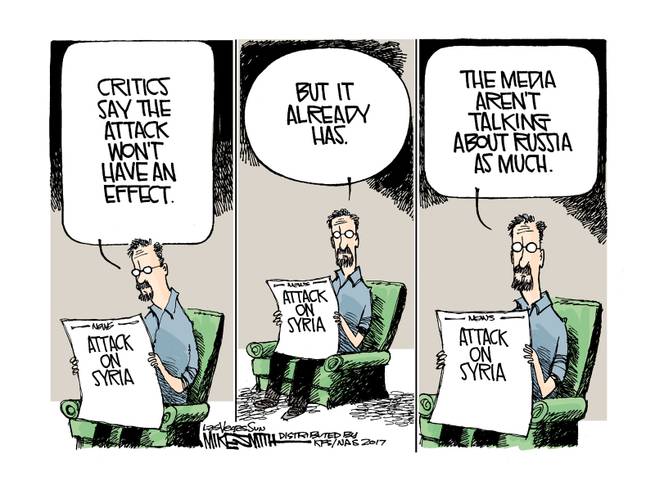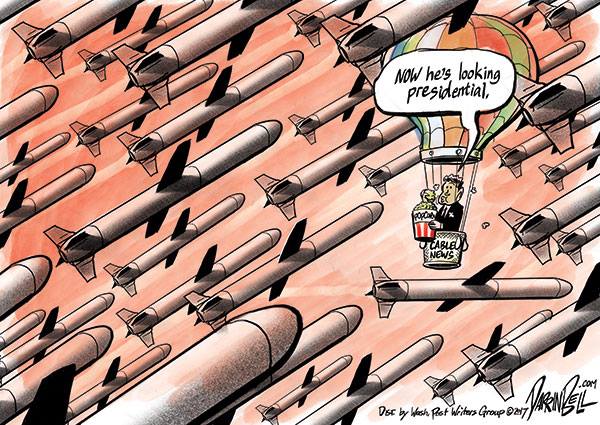Endless War category archive
War and Mongers of War 0
Josh Marshall considers the news from Asia (emphasis added):
He goes on to consider the logic of a “preemptive” strike against North Korea and concludes that, in this case at least, there is no such thing.
It resolves to a simple point: the logic of a “preemptive strike” is that you can solve or mostly solve the problem at issue by striking hard and first. But that doesn’t seem to be the case here. So a “preemptive strike” really just means starting a war, which we couldn’t necessarily control in scope or duration once we started it.
Follow the link for the full article.
The Peace Train 0
Francis J. Gavin, writing in the Minneapolis Star-Tribune, considers Americans self-image as a peace-loving people and finds it somewhere between wishful-thinking and delusion.
I don’t agree with everything he says, but I think the article is worth the few minutes it will take you to read it. Here’s a bit:
It is easy to understand why Americans embrace these views. If the U.S. and its citizens and values are associated with peace and stability, then actions that might typically be understood through the narrow lens of self-interest can instead be translated into selfless policies that benefit mankind.
(snip)
Or so the story goes. But an honest portrayal of our own history, and that of world politics over the past few centuries, casts doubt on all three assumptions.
War and Mongers of War 0
Speaking of five-year old boys playing “Bang! Bang! You’re Dead!” . . . .
“But the Emails . . . “ 0

Will Bunch, who is a fairly reasonable sort, has had enough. Here’s a bit of today’s column:
This is what’s so alarming — that Trump might blow Kim Jung-un and a few million North Koreans to smithereens just to boost his hotel occupancy rates in Vegas. Apparently, the push to save the Trump Organization for democracy is behind the recent changes at the White House; Steve Bannon and his comic-book white supremacists and pretend Nazis are on the outs, and the retired generals and the boys (and girls) from Goldman Sachs are taking charge. In other words, the “serious people” who gave us the Iraq War and the 2008 fiscal collapse. That’s the upgrade. Heaven help us.
Image via Juanita Jean.
Afterthought:
I can’t shake the thought that Donald Trump reminds of nothing so much as a five-year old boy playing “Bang! Bang! You’re Dead!”
Innocents Abroad, Collateral Damage Dept., Reprise 1
Truth? You can’t handle the truth.
Just ask your iJunk.
(I had to remove the video. Something in the embed code was making my sidebar disappear. You can view it here. Here’s a summary from the webpage: Ignorance is pandemic to American society, but maybe technology can help? Everyone has intimate relationships with their smartphones and the information that it delivers to us, however what will Apple allow us to see? Metadata+, a drone tracking app that uses information culled from news reports, appeared in the App Store, only to disappear again for mysterious and ridiculous reasons. Correspondent Naomi Karavani weighs in on how Apple can help or hinder important progress.)
The Rockets’ Red Glare, Reprise 0
Update: The video has been taken down for some reason not stated. It showed John Oliver heaping scorn on American media figures masturbating to missiles over Syria and on Trump’s hypocrisy. Oliver asked, “What did they actually achieve” and concludes the answer is “Nothing.”
Warning: Language.
Via Raw Story.
The Rockets’ Red Glare 0
It’s the Testosterone, Stupid 0
In The Sacramento Bee, Marcos Breton tries to make sense of Donald Trump’s positions on Syria and of the press’s reaction to his raining robotic death from the Syrian sky. A snippet:
Instead of criticizing Trump for attacking Syria on humanitarian grounds after seeking to block Syrian refugees, CNN commentator Fareed Zakaria praised Trump’s Syria bombing as “the moment he became the President of the United States.” MSNBC anchor Brian Williams marveled at the “beauty” of the bombs dropped on Syria as the cameras rolled. This soft media coverage evoked the lack skepticism at the start of an Iraq War in 2002 that ultimately was waged on the false pretense of Iraq harboring “weapons of mass destruction.” We can’t make that mistake again. We can’t pretend that Trump is suddenly strong for dropping 59 bombs on Syria after he and others painted Obama as weak, despite the fact that Obama dropped 12,192 bombs on Syria in 2016, according to the McClatchy Washington Bureau.
I fear that any attempt to make sense of what Donald Trump does will fail. There is no ore in that mine.
In a related piece, Steven M. tries to understand why the U. S. press seems to like war so much (at least when it’s not their children in harm’s way), despite the history of America’s failure to achieve its goals in almost every aggressive military endeavor* since World War II (in which, remember, the United States and its allies were the attacked, not the attackers).
______________________
*Just for a few examples, Korea (a stalemate at best), the Bay of Pigs, Viet Nam and Southeast Asia, Nicaragua, Afghanistan, Iran, and Iraq. I’m going to a concert this afternoon, so I don’t have time to link them all up, but you can do the research easily enough.
The significant positive outcomes for the U. S. and the West during the last six decades–notably the fall of the Berlin Wall and the raising of the Iron Curtain–were achieved thankfully short of war.
Surgical Strike 0
Afterthought:
You do realize that the phrase, “surgical strike,” is an oxymoron credible only to the other kind of morons.













